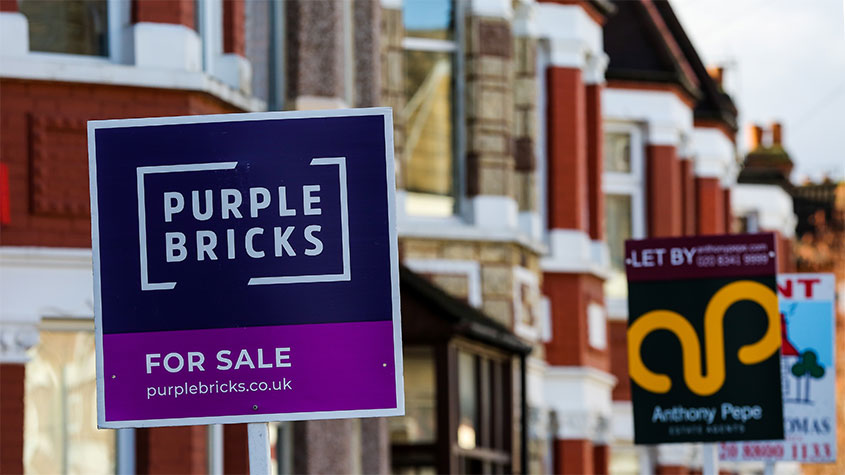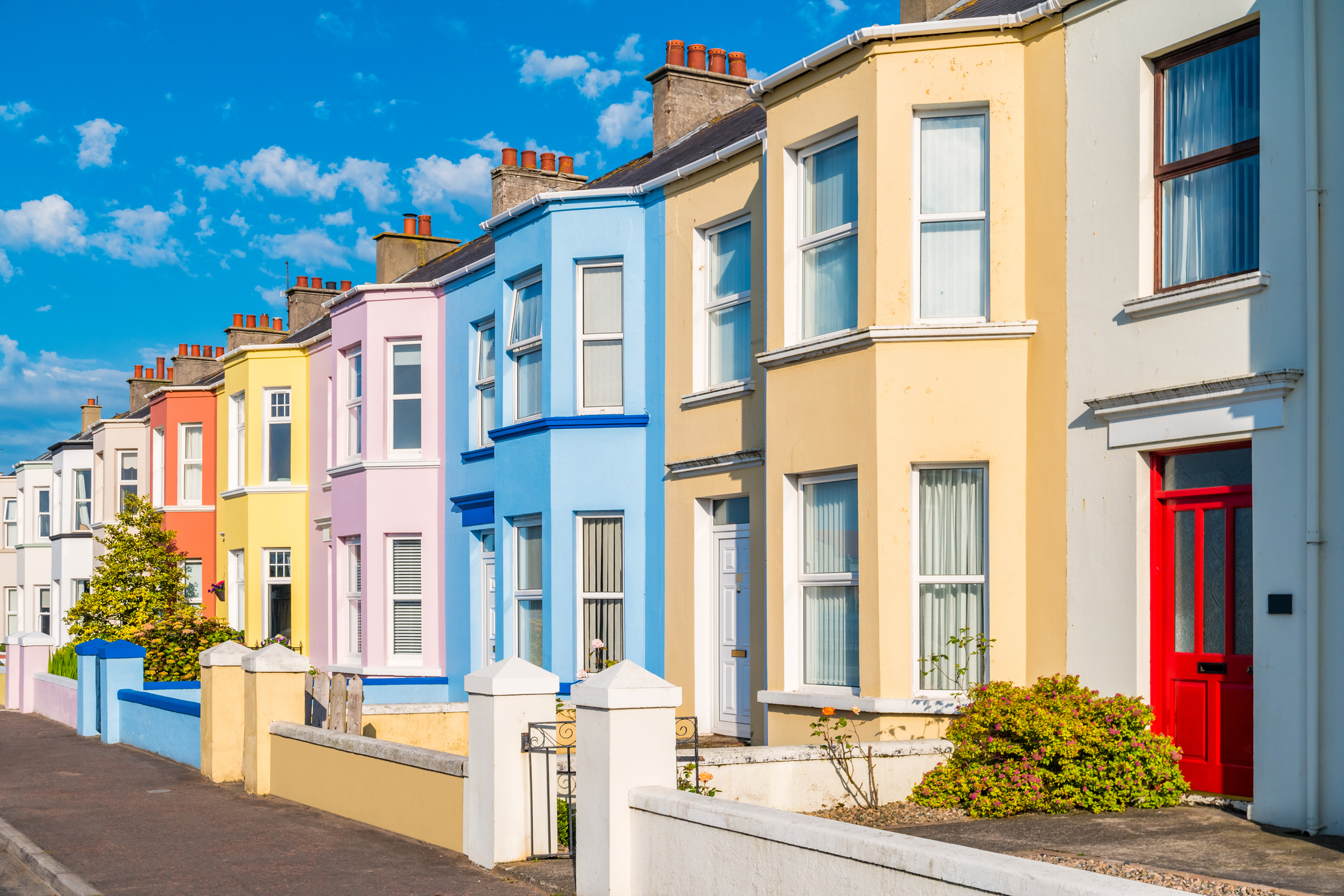UK house prices slowdown – are we heading for a crash?
The Halifax House Price Index shows house prices fell in September. Is the dip a sign of things to come?


Get the latest financial news, insights and expert analysis from our award-winning MoneyWeek team, to help you understand what really matters when it comes to your finances.
You are now subscribed
Your newsletter sign-up was successful
Want to add more newsletters?
The property market is starting to show signs of a slowdown. UK house prices fell by 0.1% in September compared to a 0.3% increase in August, Halifax’s latest House Price Index showed. Annual growth also fell, to 9.9% from 11.4% last month.
“The events of the last few weeks have led to greater economic uncertainty, however in reality house prices have been largely flat since June, up by around £250. This compares to a rise of more than £10,000 during the previous quarter suggesting the housing market may have already entered a more sustained period of slower growth,” says Kim Kinnaird, director at Halifax Mortgages.
The average price of a home now sits at around £293,835.
Try 6 free issues of MoneyWeek today
Get unparalleled financial insight, analysis and expert opinion you can profit from.

Sign up to Money Morning
Don't miss the latest investment and personal finances news, market analysis, plus money-saving tips with our free twice-daily newsletter
Don't miss the latest investment and personal finances news, market analysis, plus money-saving tips with our free twice-daily newsletter
UK house prices to be further affected by rising interest rates
Over the past decade, UK house prices have surged higher, supported by low interest rates and easy credit conditions. However, now the Bank of England has declared war on inflation by raising interest rates to 2.25%, the highest level since 2008. The outlook for property values has become more uncertain, and we can expect that to continue.
Stamp duty cuts, the imbalance of supply and demand and a strong labour market have so far supported house prices. However the Bank of England has said it won’t hesitate to raise rates further to ease the cost of living squeeze. Coupled with the “impact in recent weeks of higher mortgage borrowing costs on affordability”, these factors are “likely to exert more significant downward pressure on house prices in the months ahead”, says Kinnaird.
The slowdown came before Chancellor Kwasi Kwarteng’s mini-Budget, which saw lenders pull hundreds of mortgage products from the market.. Santander, HSBC, Yorkshire Building Society, Virgin Money and Skipton Building Society are among the lenders to have withdrawn or ceased to offer new products.
We have yet to see the full impact rising rates will have on the market. “For the mortgage and property markets, the events of the past fortnight have been like a Freddie Krueger movie,” says Ross Boyd, founder of mortgage comparison platform Dashly. “Double-digit annual price growth could be gone for a number of years given the new level mortgage rates are at and the long and protracted recession we are almost certainly on the cusp of.”
Further rate rises are likely on the cards, which will likely affect demand for property and push down prices.
How prices fared during previous recessions
“During the recession in 2008, according to Nationwide, house prices on average dropped by around 16% while during the recession in the early 90s house prices dropped by as much as 20%”, Karen Noye, mortgage expert at Quilter, tells MoneyWeek.
And according to Kunal Sawhney, chief executive of independent global equities firm Kalkine Group, UK average house prices fell as much as 21% during the recession after the 2008 crisis, with the steepest percentage falls recorded in southern England.
The UK housing market peaked after the pandemic, due to a host of reasons and partly because people had extra disposable incomes and reassessed their housing preferences, with some wanting to move to bigger homes as hybrid working became more common.
“The busts of the late 1980s and 2000s also witnessed price booms like the one recently faced,” Sawhney adds.
A report by Risk Concern, an investment strategy and risk analysis company, analysed how much UK house prices fall in a recession.
The report, which analysed six recessions between 1970 and 2020, found that in a worst case scenario UK house prices crash about 20.4% in real terms, and 7% in nominal terms. The best case scenario saw a 1.92% appreciation in real terms, or a 9.5% increase in house prices in nominal terms.
House price crash or slowdown?
Analysts and industry experts are all saying different things. Mortgage rates are higher, which will put buyers in a tricky position. However the stamp duty cut might encourage more first time buyers to close a deal. The consensus is prices will continue to fall, but whether they’ll sink entirely remains to be seen.
“With interest, and therefore mortgage rates, almost certainly set to rise higher, it is now very possible that house prices will continue to fall,” says Aaron Forster, director of mortgage broker Create Finance. “The slight drop we saw in September could speed up dramatically in the months ahead.” This could even lead to an increase in forced sales as landlords become unable to afford their mortgages.
However Andrew Montlake, managing director of mortgage broker Coreco, thinks we need to get used to house prices falling. “It’s hard to see the market going in any other direction,” he says. House prices are certainly going to come under pressure but the ongoing lack of supply makes a crash unlikely.
Get the latest financial news, insights and expert analysis from our award-winning MoneyWeek team, to help you understand what really matters when it comes to your finances.
Nic studied for a BA in journalism at Cardiff University, and has an MA in magazine journalism from City University. She has previously worked for MoneyWeek.
-
 Do you face ‘double whammy’ inheritance tax blow? How to lessen the impact
Do you face ‘double whammy’ inheritance tax blow? How to lessen the impactFrozen tax thresholds and pensions falling within the scope of inheritance tax will drag thousands more estates into losing their residence nil-rate band, analysis suggests
-
 Has the market misjudged Relx?
Has the market misjudged Relx?Relx shares fell on fears that AI was about to eat its lunch, but the firm remains well placed to thrive
-
 Why Scotland's proposed government bonds are a terrible investment
Why Scotland's proposed government bonds are a terrible investmentOpinion Politicians in Scotland pushing for “kilts” think it will strengthen the case for independence and boost financial credibility. It's more likely to backfire
-
 How have central banks evolved in the last century – and are they still fit for purpose?
How have central banks evolved in the last century – and are they still fit for purpose?The rise to power and dominance of the central banks has been a key theme in MoneyWeek in its 25 years. Has their rule been benign?
-
 Buying vs renting: is is better to own or rent your home?
Buying vs renting: is is better to own or rent your home?The higher mortgage rates of recent years have actually made renting comparatively cheaper, analysis suggests. But there are hidden costs to long term renting.
-
 Is Britain heading for a big debt crisis?
Is Britain heading for a big debt crisis?Opinion Things are not yet as bad as some reports have claimed. But they sure aren’t rosy either, says Julian Jessop
-
 Why investors can no longer trust traditional statistical indicators
Why investors can no longer trust traditional statistical indicatorsOpinion The statistical indicators and data investors have relied on for decades are no longer fit for purpose. It's time to move on, says Helen Thomas
-
 Halifax: House prices rise at fastest pace since start of year
Halifax: House prices rise at fastest pace since start of yearThe average UK house price jumped 0.4% in July, reaching £298,237, close to a record high, new house price index data shows. Will property prices increase further this year?
-
 Bank of England resolves payments issue that threatened home sales
Bank of England resolves payments issue that threatened home salesNews Homebuyers and sellers faced an anxious wait for funds to clear on property transactions today due to issues hitting the Bank's CHAPS service.
-
 How will markets react to the next Bank of England rate decision?
How will markets react to the next Bank of England rate decision?The Bank of England is due to announce its latest interest rate decision on Thursday, 2nd November, but how will markets react?
